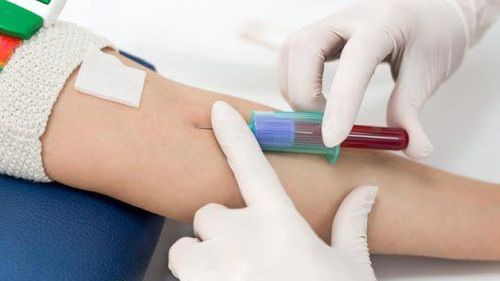This is an automatically translated article.
The article was professionally consulted with Master, Doctor Cao Thanh Tam - Cardiologist - Cardiovascular Center - Vinmec Central Park International General Hospital.Hypercoagulability syndrome is a group of diseases in which the blood clotting process occurs abnormally leading to the abnormal formation of blood clots in the blood vessels.
1. Signs of increased blood clotting?
Clinical symptoms can be seen:Hemorrhage under the skin and mucous membranes: Appearance of dots, rashes or bruises... Heavy bleeding: Gastrointestinal bleeding, brain bleeding. Hemolytic anemia with microvascular disease Fever. Consciousness disorder. Subclinical signs when doing laboratory tests:
The patient's platelet count falls below 150,000 cells/mm3. Do blood coagulation tests: Quantification of Fibrinogen breakdown products (FDPs) is increased, D - Dimer: elevated, Antithrombin(AT): low, Fibrinogen may be normal due to compensatory mechanisms in the early stages. In case of severe DIC, blood fibrinogen is always reduced to less than 1 g/l. Red blood cell fragments appear. Blood test, bone marrow biopsy to find the cause...

2. Causes of increased blood clotting?
There are many causes of hypercoagulability, which are mainly due to the causes according to the level of statistics indicated below:2.1 Having a medical condition
Infection (52%): Infection is the highest risk factor for clotting disorders Disseminated intravascular coagulation (DIC): accounted for 25%, this is a complication of many diseases such as patients with diabetes. infection, trauma, obstetric complications... Severe blood loss (8%). Microvascular thrombosis (1%): Thrombocytopenic purpura, hemolytic uremic syndrome are rare conditions, Heparin-induced thrombocytopenia Drug-induced thrombocytopenia (10%) Thrombocytopenia Immune-related (3%): Patients with antiphospholipid syndrome or systemic lupus erythematosus... After bone marrow transplantation (10%). Women during pregnancy or after giving birth (21%): Hypercoagulability causes health problems that, in severe cases, can be dangerous for both mother and unborn baby.2.2 Heredity
Congenital Deficiency of antithrombin III. Factor VIII Leyden. Protein C deficiency. Protein S deficiency. Fibrinogenemia. Plasminogen abnormality.
3. Treatment of hypercoagulable disorders
Preoperatively, small doses of 500 units of unfractionated heparin administered every 8 to 12 hours may be helpful to reduce the risk of perioperative thrombosis. Hypercoagulability during cancer treatment may be beneficial with heparin 10,000 units subcutaneously every 12 hours. Low molecular weight heparin is a more convenient and equally effective agent, requiring less laboratory monitoring.For patients with myeloproliferative disease who have symptoms of hypercoagulability, antiplatelet therapy may be beneficial. However, such treatment requires careful evaluation because these patients often have an increased risk of bleeding. For patients with erythromelalgia, aspirin 325 mg daily can be used to see the effect.
For patients with congenital biochemical defects such as antithrombin III deficiency or vitamin K-dependent C and S proteins, warfarin is effective and may require lifelong use.
Hypercoagulability is a dangerous syndrome that often occurs in patients with existing diseases. Patients need a doctor to diagnose and evaluate to proactively prevent from the very beginning.
When having the abnormal symptoms mentioned in Section 1, the patient should soon go to a medical facility for proper diagnosis, evaluation and treatment by a doctor to prevent complications from the very beginning.
Vinmec International General Hospital has a team of highly qualified doctors and nurses with modern machinery and equipment of international standards, making it a reliable destination for treatment.
Any questions that need to be answered by a specialist doctor as well as if you need to be examined and treated at Vinmec International General Hospital, please book an appointment on the website for the best service.
Please dial HOTLINE for more information or register for an appointment HERE. Download MyVinmec app to make appointments faster and to manage your bookings easily.












